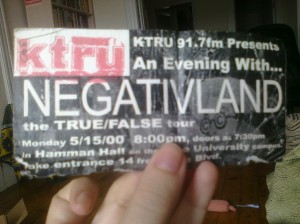I came to Rice for graduate school in the fall of 1997. I was younger than most of my fellow class, and frankly, I didn’t have much in common with them anyway. So when I found out about KTRU, I applied to be a DJ, and discovered a community of like-minded students passionate about music and the creative arts. I quickly got involved in the operations of the station well beyond the basic task of DJ-ing, eventually serving as an Assistant Music Director, Operations Manager, and Hip-Hop Director.
At KTRU I grew as a person, far more than I ever had from any of my formal education. I found my voice and learned to lead by example. I discovered skills and talents I never knew I had, like taking initiative and ownership of projects and seeing them through. And KTRU provided an outlet for some of the skills and hobbies I already possessed, like fiddling with electronics. In fact, that first year I took on the responsibility of holding together much of the equipment in the station. I remember spending over 12 hours in the studio that Thanksgiving day, DJ-ing 3 shifts and spending another few hours fixing equipment with solder, tape, and whatever else I could scrounge up. I went on to organize concerts and help with live broadcasts, among other things.
President Leebron wants to continue KTRU as an internet-only affair. I say that the radio broadcast ability of KTRU is an integral part of what makes it great. As a direct result of our broadcast ability, I have met and become friends with many individuals from the music industry nationwide as well as countless individuals from Houston’s greater arts and music communities. Our position as a voice for the underexposed side of Houston culture cannot be overvalued. On a smaller scale, I have received calls from individuals who just stumbled across my radio show and were excited to hear what I had been playing. Often these people told me that they had been Houstonites for years and never turned down to our end of the dial, but for whatever reason, they did this time. This happenstance acquisition of listeners can’t happen on the internet and consequently, KTRU as an internet-only affair is a losing proposition, one that will be unable to serve the greater Houston community.
It is stunning to me the casual disregard that Rice University’s administration has for the opinion of its own students, alumni, and extended community that they would make this deal in secret, with no discussion with the group of people who would be most affected by the transaction. Do they have the legal right to sell KTRU? Probably. But I have quite literally put hundreds of hours of sweat equity into KTRU, as have many other students, and thus I feel that in some small way, I am a part owner of KTRU. To sell it off without even so much as a discussion is disgusting.
I thank Rice University for providing me with my graduate education, but should this deal stand, I will no longer contribute financially to any other program affiliated with Rice.
Dennis Lee
Ph.D. ’05, Biochemistry and Cell Biology



